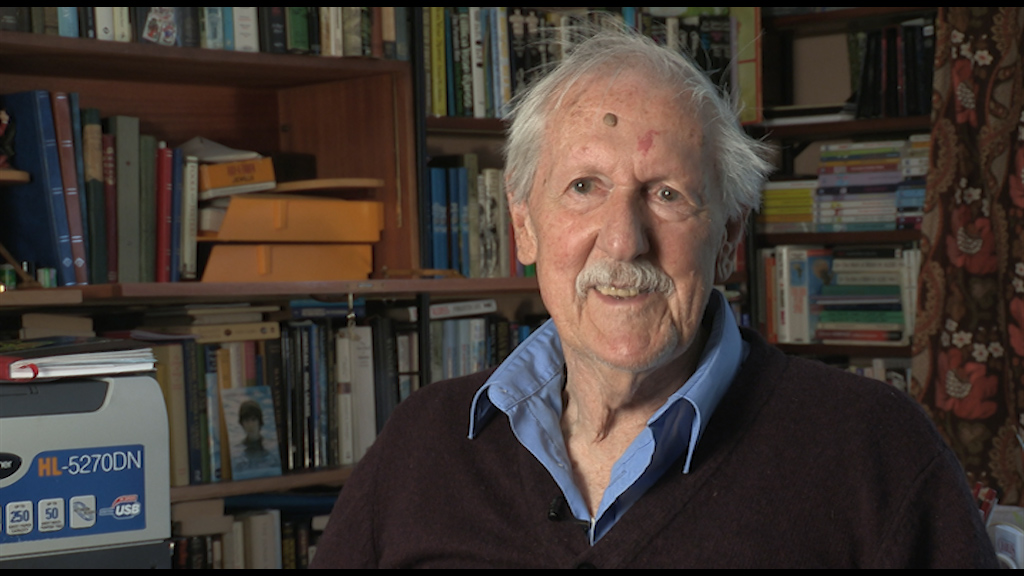NEXT STORY

Buying a house on spec
RELATED STORIES

NEXT STORY

Buying a house on spec
RELATED STORIES


|
Views | Duration | |
|---|---|---|---|
| 51. How I came by a Hermes typewriter | 47 | 03:37 | |
| 52. Being down on my uppers | 37 | 01:59 | |
| 53. My friend Harry Harrison | 54 | 01:27 | |
| 54. From misery to success | 69 | 02:35 | |
| 55. A memorable family occasion | 51 | 03:15 | |
| 56. Three generations of Buccaneers | 34 | 02:41 | |
| 57. Buying a house on spec | 34 | 05:06 | |
| 58. I fall in love with Yugoslavia | 57 | 05:43 | |
| 59. The black olives of Yugoslavia | 45 | 01:50 | |
| 60. A year’s-worth of free petrol coupons | 31 | 02:08 |


Okay, so that's a shot of family life. But now for a much happier shot. When I had this little house in Marston Street, I started to – I still had the set of Buccaneer – and I started to decorate it for when the kids came so that the kids would like it. And up in the Cowley Road there was a place that sold all kinds of plastic soldiers, Arabs and I don't know what. And so I went there and I used to buy various figures that could stand in some of the ports of Buccaneer, and various other things, oh and palm trees and so on and so on. And so the children would come and they would love to play Buccaneer.
Here we are in 2014. This year, we have played Buccaneer all those years after. My dear daughter, Wendy, now possesses the Buccaneer board and all that therein is. It's now a much bigger board – well it's on a cloth, actually – and a much bigger Treasure Island and more industrious ports.
And then they would come up regularly and always say, could we play Buccaneer?
And, as they were maturing, it was necessary to complicate this further, and so slavery came in. And for slavery – yes, it was very profitable to slave – but you had to go to London to get a pardon or you couldn't win. And so, of course, when you were going to London, all the other ships would be against you. And that was part of the fun of playing Buccaneer that throughout the years, as my dear children have developed... and now Wendy's boys, who are not of a generation of playing board games, nevertheless play Buccaneer.
So, that was one of the linkages that I had to keep in touch with my children.
Brian Aldiss (1925-2017) was an English writer and anthologies editor, best known for his science fiction novels and short stories. He was educated at Framlingham College, Suffolk, and West Buckland School, Devon, and served in the Royal Signals between 1943-1947. After leaving the army, Aldiss worked as a bookseller in Oxford, an experience which provided the setting for his first book, 'The Brightfount Diaries' (1955). His first science fiction novel, 'Non-Stop', was published in 1958 while he was working as literary editor of the 'Oxford Mail'. His many prize-winning science fiction titles include 'Hothouse' (1962), which won the Hugo Award, 'The Saliva Tree' (1966), which was awarded the Nebula, and 'Helliconia Spring' (1982), which won both the British Science Fiction Association Award and the John W Campbell Memorial Award. Several of his books have been adapted for the cinema. His story, 'Supertoys Last All Summer Long', was adapted and released as the film 'AI' in 2001. His book 'Jocasta' (2005), is a reworking of Sophocles' classic Theban plays, 'Oedipus Rex' and 'Antigone'.
Title: Three generations of Buccaneers
Listeners: Christopher Sykes
Christopher Sykes is an independent documentary producer who has made a number of films about science and scientists for BBC TV, Channel Four, and PBS.
Tags: family life, Buccaneer, board game, children
Duration: 2 minutes, 41 seconds
Date story recorded: September 2014
Date story went live: 17 August 2015